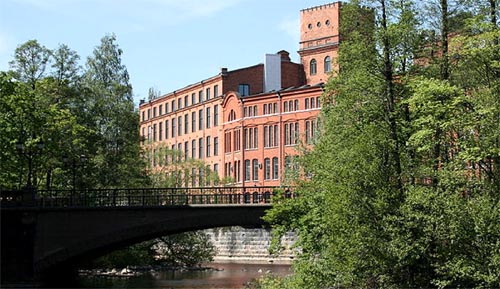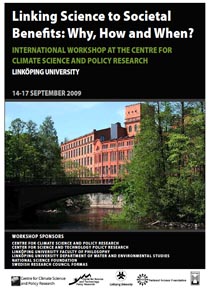Link Science to Societal Benefits: Why, How and When?14-17 September 2009 | Norrkoping, Sweden
co-sponsored by the Linkoping University’s Centre for Climate Science and Policy Research and the University of Colorado’s Center for Science and Technology Policy Research Workshop Report
The role of science in society has been widely debated in recent years. In the wake of food scares such as the GMO controversy in the EU or global environmental risks such as climate change, scholars and practitioners alike have suggested that scientific experts need to test the validity of their knowledge claims outside the laboratory. Rather than approaching the world of science as separate from society, there is today an extensive literature that seeks to hold science accountable to its public constituencies. Of central importance to this debate is the idea that science cannot function in isolation. Instead of building the scientific claim to authority on its presumed autonomy from societal context, a growing scholarship today seeks to make science more ‘socially robust’ through direct engagement with societal context. Social benefits are often advanced as the main reason for engaging actors outside science in the research process. In order to increase science’s problem-solving capacity and ability to deliver desired societal ends, it is today commonly argued that societal knowledge users should have a say in the setting and evaluation of scientific research portfolios. The workshop taps into this debate. Drawing upon many years of theoretical and empirical research on the societal use of science in a range of policy fields (climate change in particular), the workshop aims to critically assess how calls for usable science play out in practice. To that end, the workshop is organised around three thematic questions. Firstly, we will ask ‘why science should be linked to societal benefits’. Despite the recent celebration of public involvement in the production and use of scientific knowledge, a quick review of the literature in this field suggests that the debate is marred by murkiness. The lack of clarity is partly related to the range of different normative and substantive justifications for usable research. The workshop seeks to bring clarity to these theoretical justifications and assess how they hold out in practice. Secondly, the workshop will ask ‘when it makes sense to link science to societal benefits’. Considering the large public investments in science, it does, indeed, seem reasonable to demand that public funding is used to address social needs. In this workshop theme we will, however, discuss when or within which time frames we can we expect science to respond to such needs. We will also discuss what role basic and critical research portfolios will play in a science policy landscape where the eligibility of funding depend on user groups’ testimony that the proposed research will be useful to them. Finally, the workshop will ask ‘how to best link science to societal benefits’. Even when we accept the need to make science more usable to societal decision makers, empirical studies suggest that this ideal is difficult to translate into practice. To involve user groups in the design and evaluation of research portfolios is a challenging and time consuming task that requires a high degree of commitment and flexibility by all involved actors. Currently the institutional dimensions of such involvement are poorly understood. It also remains unclear which user groups to involve in the governance of science in order to ensure its legitimacy. In this workshop theme we will consequently discuss how to best navigate between the range of potential users of scientific information and their different views on desirable societal outcomes. |


